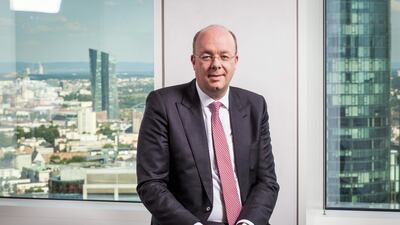A recession may not hit the US economy this year or next, however, trade tensions coupled with a slower global economy and Brexit uncertainty are forcing investors to hedge risks as they diversify investment portfolios.
"What I found interesting is that more and more investors are looking for global diversification of their portfolios," Christian Nolting, the global chief investment officer at Deutsche Bank's wealth management division, told The National in an interview. "We have had a lot of discussions and given the environment, risk management in the portfolios is extremely important."
Though wealthy investors from the Middle East and North Africa region are willing to take some risks, they want to avoid “Black Swan events like 2008 so tail risk hedging in portfolios makes a lot of sense”. Tail risk hedging involves strategies against significant market events that can negatively impact portfolios while black swan events are rare and difficult events to predict and their implications for markets and investment are compelling.
Deutsche Bank, along with the International Monetary Fund and the World Bank, have all trimmed their global economic growth forecast this year due to rising geo-political uncertainty, the ongoing US-China trade war and lower productivity gains. Although there is slowdown, Mr Nolting said, the global economy is not heading for an imminent recession.
“[Global] recession fears are overdone and central banks have taken measures to avoid this scenario and that is why markets are [now] looking at the earnings and more at the fundamentals,” he said.
A recession in the US may set it in, however the question remains when that could happen and it could happen in the eurozone earlier than other parts of the world, Mr Nolting said.
“I would not rule out a recession in the US but probably not in the immediate future. There’s a very low probability this year and next year...because the [US] government is trying to stimulate the economy with infrastructure measures” he said. “If you look at the potential growth, eurozone’s growth rate is less than Asia and, or [that of] the US and the recession in the eurozone could come earlier than other parts of the world.”
Global investors are also concerned by the uncertainty of Brexit which has deterred investment, Mr Nolting said.
“Uncertainty always troubles markets and uncertainty is holding some investment back,” he explained. “Only when we see some clarity on Brexit, investors will come back to the market.
Within its view of the global economy, Deutsche Bank, is however bullish on the Mena region's growth outlook and Saudi Arabia's economy, the region's largest, bouncing back after slowing down. Middle Eastern economies are projected to grow 3 per cent this year, according to Mr Nolting.
Germany's largest lender also expects sovereign bonds in the Middle East, particularly in the six-member economic bloc of GCC to grow this year, despite oil prices rising from their 2016 lows.
“I could imagine [bond issues] will increase,” he said. “We have seen oil prices increasing and we are at $60s [per barrel] but there is a chance for more bond issuance and I wouldn’t be surprised to see that happen this year."
To bridge budget gaps and raise financing, some Arabian Gulf states turned to debt capital markets in the wake of a three-year oil price slump that began in the middle of the 2014. As oil prices recovered in the last quarter of 2018, sovereigns pulled back on debt issuances. Oil prices are hovering above $60 per barrel, after topping $80 per barrel in the last quarter of 2018.
Emerging markets issuance is expected to rise an annual 15 per cent to $158 billion (Dh579.9bn) this year - driven by Middle East issuers. They will, however, remain below the record $674bn sold in 2017, according to Morgan Stanley.
The “oil price sensitivity is quite high, [with] price moving up or down $10 per barrel for some countries,” Mr Nolting said. “At $60 per barrel most of the countries [in the region] would do alright.”


